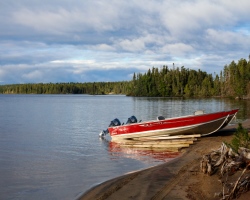Nov 28 2015
The rate of carbon burial in remote lakes has doubled over the last 100 years, suggesting even isolated ecosystems are feeling the effects of our changing climate.

Scientists from Loughborough University, Science Museum of Minnesota, and University of Quebec at Montreal, analysed data from remote lakes across North America and discovered a doubling in the rate at which these lakes sequester (bury) carbon in their sediments.
These changes are linked to fertilization of the forest and lakes by atmospherically deposited nitrogen (released by industrial pollution) and may become even greater in response to a warming climate.
Professor John Anderson from Loughborough University’s Department of Geography, who co-developed the study, said:
“Most people think of remote boreal lakes as pristine ecosystems that are protected from human impacts, but our research shows these lakes are being altered by human-induced global change.
“On its face, increasing CO2 burial may seem like good story, but it is unclear what effect these changes are having on the lakes themselves. Where is this additional carbon coming from? Are these lakes becoming browner from increasing watershed runoff? Are nuisance algae blooms becoming more frequent due to nitrogen fertilization?
“The boreal forest is the largest land biome and home to the largest concentration of liquid freshwater on Earth. Understanding how global change will impact these lakes is important both to our understanding of the cycling of greenhouse gases and to the future of our most precious resource: fresh water.”
The paper "Large increases in carbon burial in northern lakes during the Anthropocene” was published today in Nature Communications.